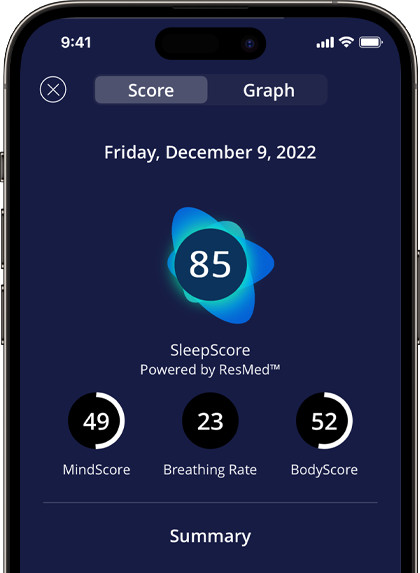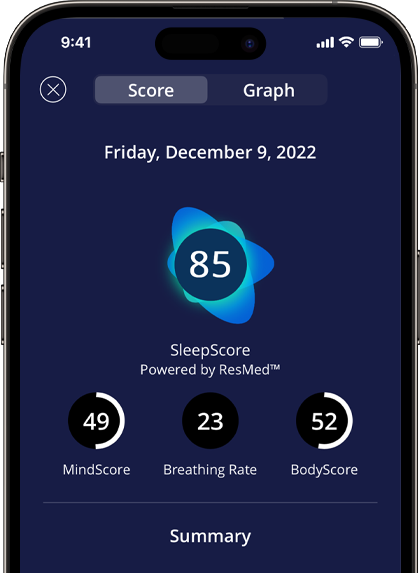SleepScore Labs Reports Provocative New Insights from 1.5 Million Nights of Sleep
Highlights:
- 79% of people get less than the recommended seven hours of sleep
- America’s SleepScore is 77 (out of 100)
- More than 30% have a SleepScore of 55 or less
- Women sleep longer – men average 5 hours, 45 minutes, while women average 6 hours, 9 minutes
- On average, Americans go to bed at 10:21 pm and wake up at 7:41 am – people in the Pacific Time Zone go to bed latest, and people in the Eastern Time Zone get up earliest
- 30 minutes of exercise correlates to 14 extra minutes of sleep per night
- 50% reported regularly using two or more sleep aids such as prescription medications, over the counter sleeping pills or herbal remedies/food supplements for sleep
LAS VEGAS – Jan. 6, 2017 – At CES 2017, shared exciting new information that will change the way people think about their sleep.
The national sleep survey and America’s SleepScore program, launched in October 2016, was developed by ResMed (NYSE: RMD) and “The Dr. Oz Show” to foster better public understanding of sleep health. More than 20,000 individuals have enrolled in the continuing study, which so far has collected more than 1.53 million night’s worth of consumer sleep data.
From the study, SleepScore Labs, a joint venture announced today between ResMed, Dr. Mehmet Oz and Pegasus Capital Advisors, LP, has determined a national SleepScore and started to analyze the data from the most comprehensive and accurate collection of high quality consumer sleep data on the planet, the landmark national sleep study on SleepScore.com.
During a panel discussion today at the CES Digital Health Summit, “Confronting the Sleep Epidemic Head-On,” Dr. Oz and ResMed will share more insights from the study.
“America didn’t do well at its checkup with a SleepScore of 77. The good news is we can use America’s SleepScore as a teachable moment and national conversation starter about how to fix our country’s sleep,” said Dr. Mehmet Oz, host of The Dr. Oz Show and co-founder of SleepScore Labs. “With the information we’re sharing today, and the work we’ll be doing through SleepScore Labs, the average person will get easy, actionable information they can start using now to improve their sleep hygiene and their overall health. More Americans than expected should be prioritizing sleep, and thankfully we have more useful tools than ever before.”
“This is the largest objective sleep study ever to be evaluated, giving us the tools to make a real impact on the pervasive public health problem of sleep deprivation,” said Colin Lawlor, CEO of SleepScore Labs. “This historic survey is also evidence of how the SleepScore by ResMed™ technology and its capabilities can be utilized across the $58 billion dollar consumer sleep industry to evaluate the performance of sleep products and services and improve them so that they can be more helpful to someone’s health. The sheer numbers of people with sleep issues are staggering, but solving the problem has until now been a shot in the dark.”
SleepScore insights include:
- 79% of the population sleeps less than the recommended 7 hours recommended by the American Academy of Sleep Medicine – Most Americans sleep one hour less. To put this in context, a recent study by AAA reported that sleeping as little as one hour less than recommended doubles the risk of a traffic accident.
- Women sleep longer than men – Men average 5 hours, 45 minutes, while women average 6 hours, 9 minutes.
- On average, Americans go to bed at 10:21 pm and wake up at 7:41 am. People in the Pacific Time Zone go to bed the latest, at 11:17 pm, and people in the Eastern Time Zone wake up the earliest at 7:40 am.
- New York vs. Los Angeles – New Yorkers go to bed earlier than Los Angeleans (by just under 3 minutes).
- Exercise is good for sleep – Any amount is helpful, but the optimal amount is 30 minutes, which correlates with 14 minutes of extra sleep per night.
- Caffeine – Three or fewer cups of coffee didn’t notably affect average sleep time much, but those who drank four cups or more slept 26 minutes less.
- Alcohol – Those who had one or two drinks slept an average of 16 minutes more than people who had more than two drinks – or none at all.
- Children can be both good and bad for sleep – Men with 0-1 children get the most sleep, and women with 2-3 children get the most sleep. Having more children seems to impact men more – they lose 45 minutes of sleep per night with 4 or more children, whereas women with 4 or more children only lose 25 minutes.
- Mattresses matter –The type of mattress people sleep on appears to make an average difference of 20 minutes sleep per night (between best and worst).
- Technology makes a difference – First cuts of the data show a clear benefit from the use of at least some smart sleep and wake lighting systems.
- The S+ Works – Poor sleepers that have used the S+ have increased their sleep by 31 minutes per night.
- Common Sleep Problems – Excessive fatigue during the day and taking too long to fall asleep were most common reported issues. Waking up in the middle of the night is also a major problem for many Americans.
- Pill Popping a Huge Issue in Sleep – A huge number (50%) reported using a mix of 2 or more sleep aids such as prescription medications, over the counter sleeping pills and herbal remedies/food supplements for sleep. This probably reflects the selection bias of device users who had greater problems achieving sleep than the average American.
- The 2016 Election – The Night America Didn’t Sleep – According to SleepScore’s National Sleep Survey, Americans lost an average of 25 minutes of quality sleep on November 8th, the night of the presidential election. Additionally, the SleepScore Survey reported that the average SleepScores for November 8th and November 9th (election night and the following night respectively) were the lowest on record, when compared to the average SleepScores of 2015 and 2016. The data showed major anomalies and significant changes in sleep times and stress levels on the East and West Coasts and some of the lowest levels recorded since the S+ device was launched in October 2014. Additionally, 30% of those on the west coast reported elevated stress levels on election night, which was similar to the East coast stress levels of 24%. Neither Coast however, has recovered since the election and both still show elevated stress levels of 17% on the East Coast and 10% on the West Coast.
- None of the data collected explored political affiliation, so it’s not possible to associate the elevated levels of stress and alcohol with any voter groups, however, it is safe to say that the 2016 election was unique in how it unfolded and the level of emotional interest on the part of the public. The data from that evening and in the week that followed shows an associative link between the intensity of the climate surrounding the election and stress levels on public health.
SleepScore Labs will be looking more closely at these and other data in the coming months.
Study Methodology:
Study participants were self-selected and likely participated out of a desire to improve their sleep, that said there also a sizeable number with good sleep. More than 20,000 participants used the S+, the most accurate and comprehensive consumer sleep technology which objectively measures movement, breathing, light, temperature and assesses sleep stage every 30 seconds during sleep. An additional 22,000 people completed quizzes that explored lifestyle habits providing additional survey data and insight into habits, practices, stress levels, alcohol, exercise and caffeine intake and various nonbiometric factors. A total of 1.53 million nights of sleep data were assessed using the SleepScore by ResMed technology measuring more than 11.1 million hours of sleep and 1.4 billion individual data points which amount to the largest objectively measured sleep study cohort in history.
About S+ by ResMed
For more information about the S+ by ResMed technology, refer to this fact sheet.
About the SleepScore Campaign
For more information on the “One Million Nights” campaign to find out America’s SleepScore, visit sleepscoredev2.wpengine.com
About SleepScore Labs
SleepScore Labs is a new company formed by Dr. Mehmet Oz, Pegasus Capital Advisors, L.P, and ResMed (NYSE: RMD) to measure, monitor and ultimately help solve the world’s sleep problems. Today, over 60% of adults in America and around the world have problems with poor sleep due to conditions like snoring, sleep apnea, insomnia, restless leg syndrome, pain, discomfort, and lifestyle choices. SleepScore Labs was created to address these issues through data collected by SleepScore by ResMed technology, the world’s first non-contact, personalized sleep solution to measure an individual’s sleep quality and deliver personalized feedback that helps improve sleep from the very first night. As part of the new venture, ResMed’s SleepScore technology will be available for licensing in new sleep products and will be used by product manufacturers to develop better sleep solutions for consumers. The technology has been licensed to several global leaders and is being used by companies, including Lighting Science Group, in studies to establish the effectiveness of consumer sleep products.
For more information on the campaign, please visit sleepscoredev2.wpengine.com. For more information on SleepScore Labs visit www.sleepscorelabs.com



